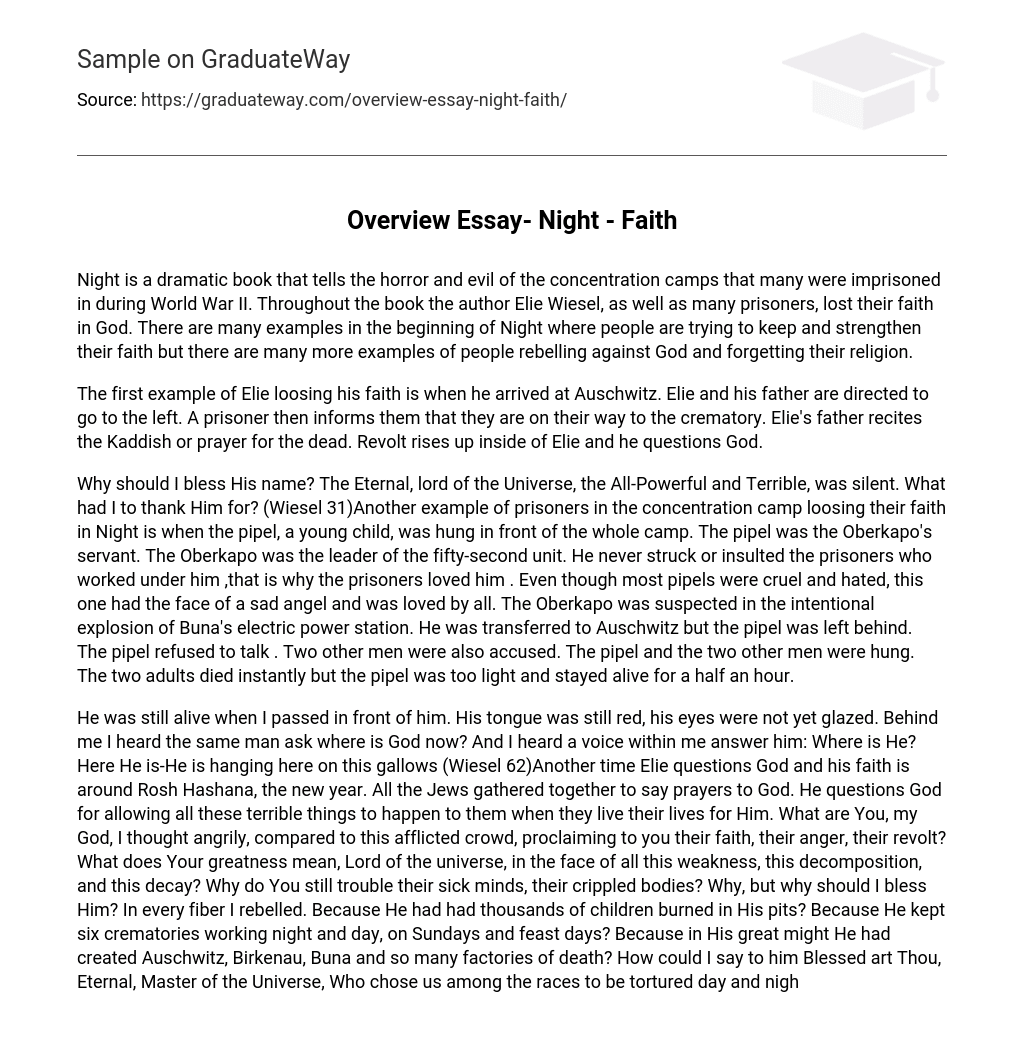Night is a harrowing literary work depicting the atrocities witnessed in the concentration camps of World War II. Both the author Elie Wiesel and fellow prisoners experience a profound loss of faith in God. The book illustrates instances at the start where individuals strive to preserve and bolster their belief, but it also presents numerous instances of people defying and forsaking their religious convictions.
The initial incident where Elie loses his faith occurs upon their arrival at Auschwitz. Elie and his father are instructed to proceed towards the left, where a fellow inmate reveals that they are being sent to the crematory. Overwhelmed, Elie’s father recites the Kaddish, a prayer for the deceased. This prompts a surge of revolt within Elie, leading him to question God.
Why should I bless His name? The Eternal, lord of the Universe, the All-Powerful and Terrible, was silent. What had I to thank Him for? (Wiesel 31) Another instance of prisoners in the concentration camp losing their faith in Night occurs when the pipel, a young child, was hanged in front of the entire camp. The pipel served as the Oberkapo’s servant. The Oberkapo, who led the fifty-second unit, had never abused or insulted the prisoners under him, which is why they held him in high regard.
Despite the general cruelty and hatred among most pipels, this particular one had the countenance of a sorrowful angel and was adored by all. The Oberkapo was under suspicion for deliberately causing an explosion at Buna’s electric power station, resulting in his transfer to Auschwitz. On the other hand, the pipel was left behind, remaining tight-lipped. Additionally, two other individuals faced accusations. Consequently, the pipel and the two other men were executed by hanging. Whereas the adults met their demise immediately, the pipel’s light weight allowed him to linger on for half an hour.
He was still alive when I passed by. His tongue remained red, and his eyes had yet to lose their luster. Behind me, I overheard the same man questioning the whereabouts of God. And from within me came a response: “Where is He? Here He is – hanging on this gallows” (Wiesel 62). On another occasion, Elie expresses doubt in his faith during Rosh Hashana, the Jewish new year, when the entire Jewish community gathers to pray. He wonders why God allows such terrible things to happen to those who dedicate their lives to Him. “What are You, my God,” I angrily thought, “compared to this suffering crowd that proclaims their faith, anger, and rebellion to You? What does Your greatness signify, Lord of the universe, in the face of such weakness, decay, and decomposition? Why do You continue to torment their troubled minds and maimed bodies? Why should I bless You?” Every part of my being rose up in rebellion.
The speaker questions why they should praise the God who allowed the burning of thousands of children and the operation of multiple crematories at all times. They also question why they should offer praise to a God who created Auschwitz, Birkenau, Buna, and other “factories of death.” The speaker reflects on how God chose their race to be tortured and see their loved ones end up in the crematory. They express their confusion and frustration at the idea of praising a God who selected them to be slaughtered on His altar. (Wiesel 63 – 64)
During “selection”, many prisoners experienced a loss of faith. This process involved choosing the weak prisoners, those who were unable to work, to be sent to the crematory. Among them was Akiba Drumer, a boy known by Elie. Akiba Drumer completely lost his faith, and without believing in God, he felt there was no purpose in living or enduring the pain and suffering caused by his religion. He even volunteered to be sent to the crematory. In his despair, Akiba Drumer aimlessly roamed among us, his eyes devoid of life, sharing with everyone his weakness and inability to continue. He confessed, “I can’t go on… It’s all over.” He had no strength or faith left (Wiesel 72-73).
Elie knew another person who lost their faith during the selections, a Polish rabbi who was formerly deeply religious and recited the Talmud from memory. However, one day he underwent a drastic change and told Elie, “It’s the end. God is no longer with us.” The book Night is a powerful portrayal of the loss of faith, where one can observe the precise moment when a character’s faith is eroded. Additionally, Night illustrates how certain individuals can continue to believe in their religion even in the face of horrific circumstances, while others will abandon their faith at the first test of loyalty.





